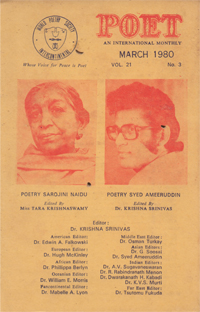 POET - MARCH -1980
POET - MARCH -1980
SYED AMEERUDDIN'S POETRY
Sri Aurobindo visioned 'future poetry' as mystical and meaningful. To Sarojini Naidu poetry is orchestration of senses. But poets of Seventies act as a bridge between tradition and dream worlds of surrealism. They hear dark voices silent to others. Their lyrics sweep into the sun. Passion and vehemence leap in waves of rhetoric, twistings of the phrases, paradoxes and ingenuities. They are poems of reality— not realism : of sentiment—not sentimentality. Their restraint of emotions is often judged as cold, abstract, intellectual—often very difficult. These poets speak in images.
There are frequent dialogues between poet and the world. The poet is caught up in something that infinitely surpasses him. There is an awareness of the presence of things in space and the present moment in time. Past and future are ideas: only the present is real.
Jorge Guillen's 'Beyond' is an excellent exposition of this precept ;
"All things,ihe millennial
Sum of our being, packed
Into the web of a minute
Eternally here, and my own.
As over the instant
That ranges in ceaseless succession
I pass through eternity's tension
To salvage the present.
The blood races on ; it flows
With a fatal avidity.
A destiny blindly assembles. Itself: I will that I be.
To be—only that ! It suffices
For pure delectation !
Thus, in a kinship of silence
To be one with the essences !"
The whole of Ameeruddin's poems is an ascension towards love. The poet attains through love the fullness of reality. Love yields him its greatest treasure. The act of love surges and resurges. He traces the passionate multi-facet^ of love and presents in very evocative way the process and evolution of love from the ideal and platonic to the pragmatic and surrealistic trends of our time :
"Gypsy river runs through my bones.
This road where you and I stand
Leads back to a barren land
We have left far behind......
Let us part,
I must wander.
Do not follow me.
Let the love
in your oyes
blossom
into secret
constellations."
Ameeruddin is a realist of the senses. The two realities, the earth and the soul, are firm in his own. The winding galleries of his mind unfurl strange tunes. There is verbal magic in his verses Green echoes haunt him like a passion. He feels poetry like fire in his hands. He replaces rpeanings by suggestions. Unsuspected impulses and unfathomable fears throb and explode.
Nature to him is a merciless genetic force which transmits to its creatures its own frenzied fury. Man-nature's favorite offering—mirrors its riotous cruelty. Love is stripped of its sentimental wrappings and reduced to the starkness of its violent rapture.
Like Lorca, Ameeruddin hungers for static inward illumination:
"Love is awakened in the greyness
of its rhythm.
Our interior sky
contains a triumph of blood.
But all our optimism
turns to sorrow.
To contemplate
the dead drops on the glass
And these drops
are eyes of the infinite; gazing
Back into the white infinity
which is their parent.
Each drop of water
trembles on the dim glass
Leaving divine
wounds of diamond.
They are poets of water
who have seen and meditate
Things which the vast crowds
of rivers ignore."
(Lofca in 'Ltuvia')
There is sheer imagistic delicacy as in "Reminiscences :"
"we sit together
holding each pulsating rhythm
in cascaded heart
and eloquent in dumb deeds
we felt the creep
of velvety longings
and eternity captured
in mute mellow mystic night."
and as in "Love Strings:"
"Yet another night
I gazed and gazed
on your rippling smiles
and diving through
your spectroscopic eyes
saw the hidden spectrum
of soul's solace
in the dewy dusk in you/'
Ameeruddin is restless of the waltzing civilisation. He lays bare the agony in the inner recesses of his soul. His poetry is lyrical and subjective: has the stamp of his unique personality — a slenderness, a nervous subtlety which makes him the finest and the most sensitive of our contemporary poets In his "A Warning/' he cries:
What happened
to that stupendous glory of man?
The ancient Nile...
and Mahenjadaro...
The great Greeks...
and the Roman grandeur...
To what disastrous doom
they were destined,
Is a monumental reminder
To the every soaring
And all bewildering
civilisation of Today...
of its frightful fate
and its
Dreadful Doom To Come..."
Here is a poem fit to adorn the airports of all warring nations.
Will humans pause and listen ?
Future is ephemeral, a mirage, a wheel coming to a circle.
KRISHNA SRINIVAS
1—2—1980
( Book Description - POET - An International Monthly - Published by - KITHABISTHAN - Book publishers -Allahabad - India - A special number on Prof.Syed Ameeruddin & Sarojini Naidu - in 65 Pages )









